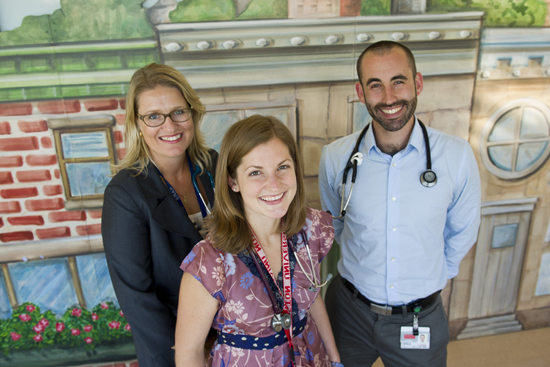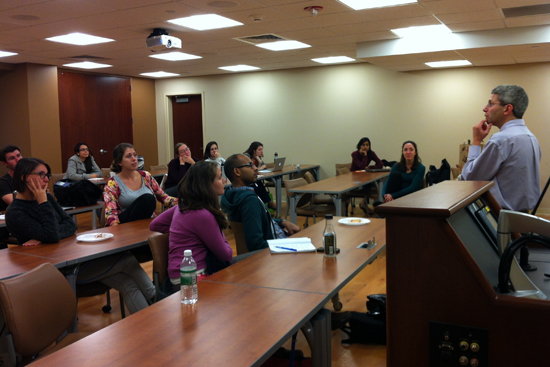Training MED Students to Become Patient Advocates
Innovative program: advocacy skills, leadership development

Megan Sandel, a MED associate professor of pediatrics (from left), alumni director Lauren Fiechtner (MED’09), and Dan Dworkis (MED’13). Photos by Cydney Scott
There is a saying on the BU Medical Campus that a cancer diagnosis may not be your patient’s biggest problem. Patients adversely affected by societal ills like poverty and environmental ones such as poor housing face a host of issues, and a life-threatening disease may be only one. To provide appropriate and effective treatment and to promote their patients’ health, physicians become advocates, but advocacy training has not often been part of formal medical education.
Students at the School of Medicine have developed a program to rectify that. As a medical student eight years ago, Chen Kenyon (MED’06) led in the creation of the first-year elective Spectrum of Physician Advocacy, mentored by Robert Witzburg (MED’77), a MED professor of medicine and associate dean for admissions.
That single elective has now blossomed into the BU Advocacy Training Program (ATP), which offers a four-year curriculum that features a pilot recently approved by MED as a scholarly concentration. Because the program is student-created and directed under faculty mentorship, students have developed not only as physician advocates, but as leaders of physician advocacy.
“The way we define advocacy is anchored in the social determinants of health,” says Megan Sandel, a MED associate professor of pediatrics and public health and ATP faculty director. “We have developed a program to help students interact with systems to improve the health of their patients. Leadership development among students, a key component of the program, really distinguishes it from other advocacy training programs.”
The program comprises a first-year course focused on the social determinants of health, taught by students who have taken the course and faculty engaged in advocacy, and a second-year course with a focus on interdisciplinary learning, taught by medical and law students and physicians and lawyers engaged in advocacy. In the third year, students learn from case-based online modules related to the rotations they are taking that year, and in the fourth year they choose an advocacy project mentored by a faculty member.
“We offer an advocacy training program for anyone who wants to be involved at whatever level, as students can take the four-year concentration or they can take components of the program,” Sandel notes. “A fitting analogy is that everyone takes cardiology in medical school with the understanding that not everyone is going to be a cardiologist, but we think learning how the heart works is inherent to being a good physician. Every physician should at least be aware of advocacy skills and competencies, while a certain subset is going to go on to be that advocacy specialist, which will be a career-defining part of their profession. We want our curriculum offerings to be able to toggle between both.”
The ATP trains medical students to advocate for the health and well-being of patients and their communities. “At the end of medical school we want our students to be able to understand the social determinants of health at a theoretical level,” says program alumni director Lauren Fiechtner (MED’09), a recent graduate of the Boston Medical Center–Boston Children’s Hospital Boston Combined Residency Program in Pediatrics. “They also will be able to screen patients for social risk factors affecting their current and future health, intervene directly to address the social issues disrupting a patient’s health at the individual or community levels, and leverage resources to effect broader change by addressing these social issues at the community, state, national, or international levels.”
Approximately 15 percent of students in each class participate in the program. Some of them go on to teach in the program, mastering content and resources and acquiring the skills and techniques necessary to teach. They also become mentors to fellow students. “As a resident you have to teach, but you aren’t formally taught how to teach in medical school. This program provides that opportunity,” Fiechtner says.

The curriculum addresses how advocacy can be applied to direct patient care, why advocacy is linked to the mission of medicine, how to highlight health disparities at all levels, and how to identify local trends in health outcomes and potential interventions to address inequities. Students learn to translate patient information and community trends into data that can help inform health and public policy making and to recognize opportunities for greater involvement in promoting individual patient health and well-being, community development, health policy, and global health.
They are also taught how to create research-based advocacy tools, how to screen for housing, food, and energy problems, and how immigration status and eligibility for benefits influences health and health outcomes. Students attend sessions and complete assignments that help develop skills necessary to write abstracts for scientific conferences and letters to the editor.
Last spring, students in the first year course researched and reported on resources available to patients at BMC. They created a central database that hospital health care providers can access easily, streamlining the process of matching up patient need with a program or agency to help meet the need.
Mentorship is a significant component of the program. The Medical Campus mission to care for the underserved means many faculty members are involved in, and committed to, physician advocacy. “A major benefit to students is access and exposure to physician leaders who are advocates in their own right,” says ATP student director Dan Dworkis (MED’13). “We are fortunate to be in an institution that values advocacy as one of the components of providing health care. Students come here because they want to work with the underserved. We aren’t afraid of tackling these issues, and we are fortunate to be led by physicians who feel the same way.”
Sandel, a nationally recognized expert on housing and child health, is a former director of Pediatric Healthcare for the Homeless at BMC, a coinvestigator for BMC’s Children’s HealthWatch, and medical director of the National Center for Medical-Legal Partnership.
Among faculty who mentor students and speak on topics related to the curriculum are Thea James, a MED associate professor of emergency medicine and director of the BMC Violence Intervention Advocacy Program, which helps victims of violence recover from physical and emotional trauma, and Jessie Gaeta, an ATP core faculty member and medical director of the Boston Health Care for the Homeless Program’s Barbara McInnis House and cofounder of the Home & Healthy for Good program of the Massachusetts Housing and Shelter Alliance.
“Fundamentally, the health of our patients requires that we understand these issues,” says Dworkis, who develops curriculum and written materials, helps other students lead classes, fundraises, and manages the logistics of operating the program. “We need to be leaders to help change the circumstances that affect the way our patients are living. To improve their health, we need to help change their circumstances.”
Some of the projects ATP students have participated in include developing a tool kit that providers can use to help patients get food benefits that are often denied on first request; creating a website that links providers with housing code enforcement agencies to help patients with housing situation compromising their health; and developing a pilot program to form a team of BU medical, legal, educational, and business students to advocate with social services agencies on behalf of residents in public housing projects to improve their fiscal and physical health.
Dworkis envisions an institute for medical advocacy. “I think BU is uniquely positioned among medical schools in Massachusetts to be a center for medical advocacy,” he says. “Advocacy is ingrained in our mission. We have phenomenal staff, and we are constantly evolving and upgrading our curriculum and reaching out to get more faculty involved. We are also energizing our alumni, who work on these issues across the country and around the world.”
“The BU Advocacy Training Program is an example of the School of Medicine building future leaders in medical education through an innovative, student-led, faculty-mentored curriculum,” says Karen Antman, dean of MED and Medical Campus provost. “This will become a model for medical schools throughout the country.”
Mary Hopkins can be reached at mhopkin@bu.edu.
A version of this story was published in the fall 2012 edition of Boston University School of Medicine Campus + Alumni News.
Comments & Discussion
Boston University moderates comments to facilitate an informed, substantive, civil conversation. Abusive, profane, self-promotional, misleading, incoherent or off-topic comments will be rejected. Moderators are staffed during regular business hours (EST) and can only accept comments written in English. Statistics or facts must include a citation or a link to the citation.